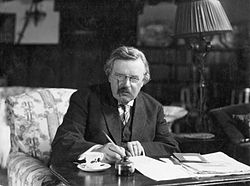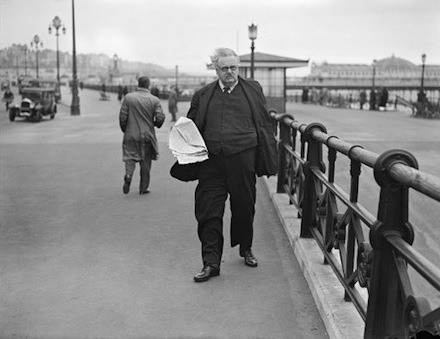« There was about him that edge, like the edge of a sword, which I cannot help preferring to being knocked down with a spiritual sandbag. » G. K. Chesterton (« Autobiography »)
« I called myself a Socialist; because the only alternative to being a Socialist was not being a Socialist. And not being a Socialist was a perfectly ghastly thing. I meant being a small-headed and sneering snob, who grumbled at the rates and the working-classes; or some hoary horrible old Darwinian who said the weakest must go to the wall. But in my heart I was a reluctant Socialist. I accepted the larger things as the lesser evil — or even the lesser good. » G. K. Chesterton (« Autobiography »)

Gilbert Keith Chesterton (1874-1936)
Il y a quelques années, en me promenant sur Grafton Street, à Londres, j’ai dégoté des livres comme on n’en fait plus, des livres destinés à des personnes qui envisagent la lecture comme un acte sérieux, religieux même. Parmi ces livres, un livre à couverture noire, cartonnée et entoilée, avec lettres dorées sur le dos, soit : G. K. Chesterton, Autobiography. Rien en première et en quatrième de couverture, une austérité de bon aloi. Le papier en est épais, presque crémeux, et filigrané. Il s’agit de la Twelfph Impression, Made and Printed in Great Britain at ‟The Mayflower Press”, Plymouth. William Brendon & Son, Ltd. 1937. Neuf photographies accompagnent cette édition. Huit d’entre elles montrent l’auteur à différents âges — G. K. Chesterton était un bel enfant avant de devenir ce volumineux bonhomme, sorte de Roscoe C. Arbuckle (surnommé « Fatty ») — tandis que la neuvième montre la maison de Beaconsfield, Top Meadow, où l’auteur vécut de 1922 à sa mort en 1936.
J’ai choisi de rapporter le passage ci-dessous parce qu’il me semble caractéristique de l’esprit de G. K. Chesterton. Il est vrai que j’aurais pu en choisir bien d’autres car à chaque page se laisse goûter la puissante saveur du paradoxe — une féconde étrangeté. J’ai choisi de rapporter ce passage parce que moi aussi j’ai joué à diviser et subdiviser ainsi l’espace, chez moi et à l’extérieur, avec notamment ce jeu qui « deprives this world of half its paving-stones », sans oublier cet autre jeu qui consistait à faire du sofa de la maison une embarcation cernée par la mer, par la tempête :
« The ordinary poetic description of the first dreams of life is a description of mere longing for larger and larger horizons. The imagination is supposed to work towards the infinite; though in that sense the infinite is the opposite of the imagination. For the imagination deals with an image. And an image is in its nature a thing that has an outline and therefore a limit. Now I will maintain, paradoxical as it may seem, that the child does not desire merely to fall out of the window, or even to fly through the air or to be drowned in the sea. When he wishes to go to other places, they are still places; even if nobody has even been there. But in truth the case is much stronger than that. It is plain on the face of the facts that the child is positively in love with limits. He uses his imagination to invent imaginary limits. The nurse and the governess have never told him that it is his moral duty to step on alternative paving-stone. He deliberately deprives this world of half its paving-stones, in order to exult in a challenge that he has offered to himself. I played that kind of game with myself all over the mats and boards and carpets of the house; and, at the risk of being detained during His Majesty’s pleasure, I will admit that I often play it still. In that sense I have constantly tried to cut down the actual space at my disposal; to divide and sub-divide, into these happy prisons, the house in which I was quite free to run wild. And I believe that there is in this psychological freak a truth without which the whole modern world is missing its main opportunity. If we look at the favourite nursery romances, or at least if we have the patience to look at them twice, we shall find that they all really support this view; even when they have largely been accepted as supporting the opposite view. The charm of Robinson Crusoe is not in the fact that he could find his way to a remote island; but in the fact that he could not find any way of getting away from it. It is that fact which gives an intensive interest and excitement to all the things that he had with him on the island; the axe and the parrot and the guns and the little hoard of grain. The tale of Treasure Island is not the record of a vague desire to go on a sea voyage for one’s health. It ends where it began; and it began with Stevenson drawing a map of the island, with all its bays and capes cut out as clearly as fretwork. And the eternal interest of the Noah’s Ark, considered as a toy, consists in its complete suggestion of compactness and isolation; of creatures so comically remote and fantastic being all locked up in one box; as if Noah had been told to pack up the sun and moon with his luggage. In other words, it is exactly the same game that I have played myself, by piling all the things I wanted on a sofa, and imagining that the carpet around me was the surrounding sea.
This game of self-limitation is one of the secret pleasures of life. As it says in the little manuals about such sports, the game is played in several forms. One very good way of playing it is to look at the nearest bookcase, and wonder wether you would find sufficient entertainment in that chance collection, even if you had no other books. But always it is dominated by this principle of division and restriction; which begins with the game played by the child with the paving-stones. But I dwell upon it here because it must be understood as something real and rooted, so far as I am concerned, in order that the other views I have offered about these things may make any sort of sense. If anybody chooses to say that I have founded all my social philosophy on the antics of a baby, I am quite satisfied to bow and smile. »
Cet homme fascine avec ses glissements de sens jusqu’au paradoxe, cet homme qui l’air de rien — et avec une franche bonhomie — met tout upside down et fait le monde topsy-turvy. Ce non-conformiste gentiment féroce n’hésite pas à se déclarer conformiste pour mieux faire perdre l’équilibre à ces anti-conformistes patentés qui s’ignorent mais qui finissent pour certains par en prendre conscience (sans toujours l’avouer) face à ce bon gros — taille : six feet, four inches ; poids : three hundred pounds. A ce propos, il se moquait volontiers de son poids, de son volume. Il disait par exemple qu’il était l’homme le plus poli d’Angleterre puisqu’en cédant sa place dans un autobus, il la cédait d’un coup à trois femmes. Embarquer avec G. K. Chesterton, c’est tanguer au point de ne plus vraiment savoir où est la proue où est la poupe ; c’est gîter au point de ne plus vraiment savoir où est bâbord où est tribord. Et bâbord et tribord (soit respectivement gauche et droite) pourraient être envisagés dans leur acception politique. G. K. Chesterton était un polémiste passionné qui renvoyait dos à dos tout le monde. Je ne vois vraiment pas qui opposer à ce bretteur enjoué. Si ! Peut-être George Bernard Shaw !
Lire G. K. Chesterton est un régal. On avance comme dans une galerie d’illusions d’optique. On tâtonne, on se cogne, on cherche la sortie en espérant ne pas la trouver, car on veut malgré tout faire durer le plaisir tout en se répétant qu’il faudra tout de même se reposer du paradoxe… pour mieux y revenir. En le lisant, j’ai même surpris la silhouette de Franz Kafka. L’humour chez l’un et chez l’autre. Certains de ses aphorismes m’ont conduit vers celui-ci, avec ces paradoxes qui font palpiter l’espace mental. Jorge Luis Borges a lui aussi noté un air de famille entre ces deux écrivains, par cette puissance du paradoxe et les situations étranges voire grotesques qu’il suscite.
Mais à quoi répond donc ce goût du paradoxe si parfaitement prononcé ? Je ne sais. Le paradoxe chez G. K. Chesterton est énorme ; il en retire une énergie qui s’apparente à l’énergie nucléaire, soit une énergie quasi-inépuisable, d’où probablement cette production phénoménale. Comment a-t-il trouvé le temps de produire à ce point, lui qui était par ailleurs si sociable ? Des milliers d’articles et je ne sais combien de livres qui touchent à presque tous les genres. Avec G. K. Chesterton le paradoxe n’est pas enfermé en lui-même, simple exercice d’adresse, acrobatie à couper le souffle, mais acrobatie et rien de plus. Avec G. K. Chesterton le paradoxe ouvre de profondes perspectives morales ; car cet écrivain est bien un moraliste, un immense moraliste dont on peut mesurer la stature de visionnaire (une stature qui ne cesse de grandir), quatre-vingt ans après sa mort. Il a dénoncé le triomphe (mortifère) du matérialisme, le relativisme de la morale et la mise au placard de la religion. Il a dénoncé la puissance toujours augmentée de la presse qui après avoir été censurée censure. Il a dénoncé l’enlaidissement de l’art. Bref, il a dénoncé l’aire des masses et des gouvernements mondiaux capables de contrôler les flux économiques et financiers et de noyer l’individu dans une soupe tellement épaisse qu’il lui est (presque) impossible de s’en extirper. Ce colosse débonnaire — dont on dit qu’il souriait tout le temps et dispensait de la bonne humeur — reste l’air de rien un féroce dénonciateur. Bien qu’exprimées avec jovialité, ses dénonciations ne sont pas moins virulentes que celles de Georges Bernanos, de José Ortega y Gasset (voir « La rebelión de las masas ») ou de Karl Kraus qui souligna le rôle central de la corruption du langage (le plus dangereux des maux) par la presse.

Ci-joint, le website « Chesterton and Friends » :
http://chestertonandfriends.blogspot.com.es/2006/07/belloc-vs-kafka-battle-for-joy-part-3.html
Et le website « The American Chesterton Society » :
http://www.chesterton.org/about-us/
Olivier Ypsilantis